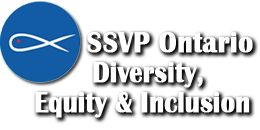





|
November 2024 WHY IS DIVERSITY, EQUITY & INCLUSION IMPORTANT?As we explore the issue of diversity, equity & inclusion and why the Society of Saint Vincent de Paul should be an active participant in finding ways to address this topic, I look at our basic mission and values and the fact that we simply seek to help our neighbours in need regardless of race, culture, faith traditions, gender identification or if they are disabled persons. We engage in this personal from of relationship without judgement of the person.It would seem a logical step that we also commit to and support this issue. Let us first look at what is meant. Diversity is the psychological, physical and social differences that occur among any and all individuals including but not limited to race, ethnicity, nationality, religion, sexual orientation, socioeconomic status, education, marital status, language, age, gender, mental or physical ability and/or learning styles. Equity is the guarantee of fair treatment, access, opportunity and advancement while at the same time striving to identify and eliminate barriers that have prevented the full participation of some groups. The principle of equity acknowledges that there are historically underserved and underrepresented populations, and that fairness regarding these unbalanced conditions is needed to assist equality in the provision of effective opportunities to all groups. Inclusion is the act of creating environments in which any individual or group can be and to feel welcomed, respected, supported and valued to fully participate and bring their full, authentic selves to work. An inclusive and welcoming climate embraces differences and offers respect in the words/actions/thoughts of all people. By embracing and supporting actions that demonstrate our commitment to diversity, equity and inclusion the Society of Saint Vincent de Paul exemplifies what being a Vincentian means. By becoming an organization that reflects the demographical differences we see in our neighbours in need, we enhance our ability to share with one another the various views of a more diverse membership. Jim Paddon, Chair ONRC Public Policy Dialogue & Development Diversity, Equity
|








